Not content with making money from adults paying for its controversial large group awareness training (LGAT) the controversial company called “Landmark Education” targets minor children.
 Kids as young as eight were recently enrolled at a cost of “$700 a child” in Australia to go through Landmark’s “intensive three-day workshop” reported The Sunday Times.
Kids as young as eight were recently enrolled at a cost of “$700 a child” in Australia to go through Landmark’s “intensive three-day workshop” reported The Sunday Times.
40 elementary school children were signed up this month in Perth for the supposedly “life-changing” LGAT based upon the teachings of a former used car salesman “Jack” Rosenberg, who later changed his name to Werner Erhard.
Erhard had no educational or counseling credentials to guide him, but rather his personal experience dabbling in fringe self-improvement groups like Scientology.
He created a company during the 1970s called “est” (Erhard Seminar Training) that presented an initial introductory program called The Forum.
Est was reportedly sold in 1992 and was subsequently renamed “Landmark Education.” Erhard’s brother Harry Rosenberg and his sister now run the private for-profit company.
Landmark turned Erhard’s concocted philosophy into LGAT gold, making millions of dollars every month in fees. The company has never been bigger or more successful since its inception.
Landmark has a formula to make even more money.
First it recruits parents to take its courses and then the company gets them to enroll their kids.
This can potentially cause conflict, if parents are divorced and share joint custody.
A Perth policeman refused to let his ex-wife send their daughter to the LGAT.
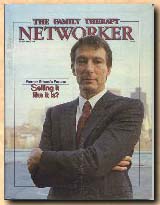 “It struck me as a money-making enterprise and I really thought that the three-day seminar could be quite stressful and draining,” he said. The officer also questioned why anyone would put an 8-year-old through something so “stressful or draining” referring to Landmark’s methods as “pressure-cooker teaching.”
“It struck me as a money-making enterprise and I really thought that the three-day seminar could be quite stressful and draining,” he said. The officer also questioned why anyone would put an 8-year-old through something so “stressful or draining” referring to Landmark’s methods as “pressure-cooker teaching.”
But kids have become lucrative for Landmark, which runs programs in the US for children 8-12 and teens too.
Effectively Landmark has turned families into “cash cows” and has successfully milked almost 2,000 kids in Australia alone.
Landmark’s programs are controversial and some have called them “brainwashing.”
The company has a long history of bad press and it garnered some more this month “down under.”
Australian adolescent psychologist Michael Carr-Gregg warned parents “to be wary” of the workshop and called it an “utter waste of money.”
“If a child has a major psychological problem they should go to a fully qualified, government-accredited professional,” he said.
It is unclear what educational requirements Landmark requires or expects from its seminar leaders, who are typically neither mental health professionals, nor licensed or accountable to any government regulatory or accrediting body.
The psychologist was also concerned about “overloading children on the weekend” and he said, “sticking a kid in there for three days is pretty awful.”
Greg isn’t the only doctor worried about LGATs like Landmark.
Clinical psychologist Philip Cushman studied LGATs in the 1990s and published a paper after researching what he called “mass marathon training.”
Cushman saw serious problems for adults, let alone children.
In his paper titled “The Politics of Transformation: Recruitment – Indoctrination Processes in a Mass Marathon Psychology Organization” Cushman says that such “training is usually based on the belief that it is a universal truth that all human beings will have problems in life until they develop deep cathartic psychological insight, experience completely their every feeling, and live only in the present moment.”
Cushman goes on to explain that “according to this ideology all defenses are bad and must be destroyed. They shape their group exercises in order to uncover and intensify the participants’ underlying conflicts and deficits. Everyone must be exposed to these exercises; there are no exceptions. When all defenses are destroyed, they claim there is literally no limit to what each individual can accomplish.”
What the psychologist describes is reflected in Landmark Education’s repetitious vocabulary filled with buzz words like “breakthrough,” “integrity,” “transformation” and “completion” that become a kind of “loaded language” for its graduates.
Landmark’s spokesperson told the press in Perth that the LGAT enabled children to “gain clarity” and “examine their lives in a way, which leaves them empowered,” which gives them “a new freedom in life…[for] powerfully facing…risks and challenges…”
Cushman pointed out more than a dozen serious problems that frequently pop up wit LGAT groups like Landmark.
- They lack adequate participant-selection criteria.
- They lack reliable norms, supervision, and adequate training for leaders.
- They lack clearly defined responsibility.
- They sometimes foster pseudoauthenticity and pseudoreality.
- They sometimes foster inappropriate patterns of relationships.
- They sometimes ignore the necessity and utility of ego defenses.
- They sometimes teach the covert value of total exposure instead of valuing personal differences.
- They sometimes foster impulsive personality styles and behavioral strategies.
- They sometimes devalue critical thinking in favor of “experiencing” without self-analysis or reflection.
- They sometimes ignore stated goals, misrepresent their actual techniques, and obfuscate their real agenda.
- They sometimes focus too much on structural self-awareness techniques and misplace the goal of democratic education; as a result participants may learn more about themselves and less about group process.
- They pay inadequate attention to decisions regarding time limitations. This may lead to increased pressure on some participants to unconsciously “fabricate” a cure.
- They fail to adequately consider the “psychonoxious” or deleterious effects of group participation (or] adverse countertransference reactions.
Cushman warns specifically “as a result, participants and leaders may unconsciously distort their feelings and responses when reporting to researchers about the group or recruiting for future groups. This might result in a deceptive ‘oversell’ that could undermine informed consent and lead to unrealistic regressive expectations in new recruits, the specific type of problems that have been found to lead to psychological casualties.”
Landmark’s long history of personal injury lawsuits goes back to its old “est” days.
Many participants claimed they were hurt by Landmark and some sued.
In fact, Landmark is so concerned about legal liability that it now requires participants to sign a waiver, whereby they cannot take the company to court before a jury, but instead must submit to “binding arbitration.”
Essentially, this acts as “poison pill” to fend off litigation.
Does this sound like something that an 8 to 12-year-old child or teen should be involved in?
Landmark is good at persuading people that its courses are positive and that they somehow produce benefits.
In polling gathered through surveys often sponsored and/or paid for by the company, a high percentage of its graduates are convinced that they benefited in some way from attending the LGAT.
However, these are subjective responses about how participants feel, not objective results that have been scientifically measured.
Should parents and the general public be wary?
Is there something potentially unsafe about an LGAT like Landmark?
According to Cushman’s research LGATs can become “dangerous” when they demonstrates the following criteria:
- Leaders [have] rigid, unbending beliefs about what participants should experience and believe, how they should behave in the group and when they should change.
- Leaders [have] no sense of differential diagnosis and assessment skills, valued cathartic emotional breakthroughs as the ultimate therapeutic experience, and sadistically pressed to create or force a breakthrough in every participant.
- Leaders [have] an evangelical system of belief that was the one single pathway to salvation.
- Leaders [are] true believers and sealed their doctrine off from discomforting data or disquieting results and tended to discount a poor result by, “blaming the victim.”
Landmark’s own training manuals for its Forum Supervisors states, “a Landmark Forum Supervisor’ needs to be an s.o.b. for impeccability. You need to give up a concern for being liked…Be a destroyer…” and “Don’t ever let people move or stand up or talk before you have declared the start of the break. Don’t ever let stuff like that go by. Ever, ever, ever.”
Landmark’s own warnings and disclaimers in its application for the Landmark Forum states, “…people will from time to time cry or experience headaches, tiredness, nausea, confusion, disappointment, feelings of anxiety, uncertainty, and hopelessness. Some participants may find the Program physically, mentally, and emotionally stressful.”
In an article titled “Drive-thru Deliverance” a Forum leader reportedly told participants “Anything you want in life is possible that you invent as a possibility and enroll others in your having gotten.”
Those attending the Forum in Phoenix asked “why the rules [were] so rigid”?
They were told that “transformation” required following rules, and they soon learned that those that broke the rules might be humiliated and labeled as “uncoachable.”
Werner Erhard the seminar guru that concocted this LGAT claimed that he received a revelation while driving on a California freeway in 1971, he realized that he knew nothing. And the instant he realized that he knew nothing, he then realized he knew everything, and everything was good.
Landmark teaches a philosophy that becomes a belief system for its adherents, and some seem to consider it their “salvation.”
 “It happens to every star,” says In the Zone.
“It happens to every star,” says In the Zone. Ironically though, as CultNews previously reported, despite her fading star status Madonna sees herself as some sort of career counselor to younger stars. And her latest acolyte is 20-year-old Lindsay Lohan.
Ironically though, as CultNews previously reported, despite her fading star status Madonna sees herself as some sort of career counselor to younger stars. And her latest acolyte is 20-year-old Lindsay Lohan.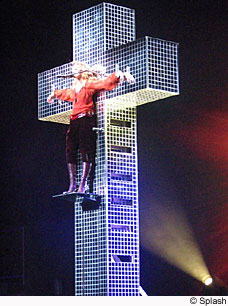 Her publicist has told the press “I defy any 18-year-old to do a quarter of what Madonna does on stage…”
Her publicist has told the press “I defy any 18-year-old to do a quarter of what Madonna does on stage…”


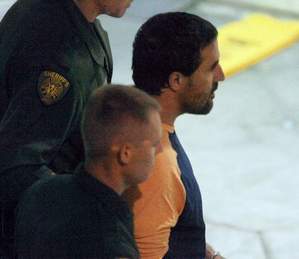 Mack was wanted for the brutal murder of his wife Charla in Reno, Nevada.
Mack was wanted for the brutal murder of his wife Charla in Reno, Nevada. Kids as young as eight were recently enrolled at a cost of “$700 a child” in Australia to go through Landmark’s “intensive three-day workshop”
Kids as young as eight were recently enrolled at a cost of “$700 a child” in Australia to go through Landmark’s “intensive three-day workshop”  “It struck me as a money-making enterprise and I really thought that the three-day seminar could be quite stressful and draining,” he said. The officer also questioned why anyone would put an 8-year-old through something so “stressful or draining” referring to Landmark’s methods as “pressure-cooker teaching.”
“It struck me as a money-making enterprise and I really thought that the three-day seminar could be quite stressful and draining,” he said. The officer also questioned why anyone would put an 8-year-old through something so “stressful or draining” referring to Landmark’s methods as “pressure-cooker teaching.”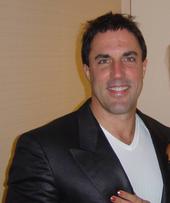 Darren Roy Mack, 45, reportedly “traveled extensively to lead the courses” for Landmark. The
Darren Roy Mack, 45, reportedly “traveled extensively to lead the courses” for Landmark. The 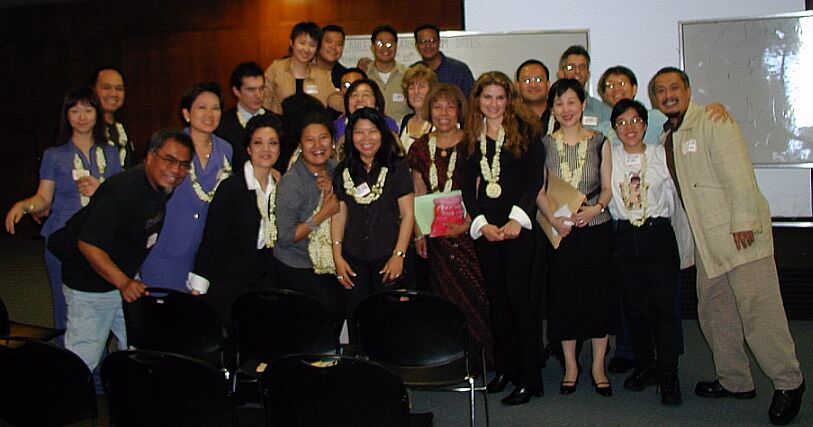 “Darren, I know you from Landmark Education…I just wanted to remind you about what you used to teach others – about integrity and completion of the past and affinity. Remember? You know you’re driving yourself crazy with all the things you’re telling yourself. You also know the only way through this is through it. I know you have the ability to get this complete – as hard as it’s going to be for you. You can do it. Turn yourself in and start the process of getting it complete. Get in communication, Darren.”
“Darren, I know you from Landmark Education…I just wanted to remind you about what you used to teach others – about integrity and completion of the past and affinity. Remember? You know you’re driving yourself crazy with all the things you’re telling yourself. You also know the only way through this is through it. I know you have the ability to get this complete – as hard as it’s going to be for you. You can do it. Turn yourself in and start the process of getting it complete. Get in communication, Darren.” Landmark now seems anxious to erase any record or memory of the Macks.
Landmark now seems anxious to erase any record or memory of the Macks.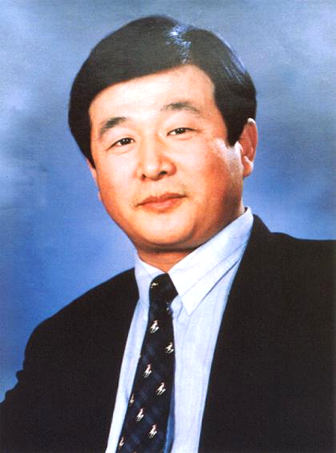 That court proceeding is a divorce action filed by one of Hongzhi’s followers against her husband. The couple is estranged largely because of Falun Gong.
That court proceeding is a divorce action filed by one of Hongzhi’s followers against her husband. The couple is estranged largely because of Falun Gong. Falun Gong has caused increasing tension within the Chinese-American community. Some communities, such as
Falun Gong has caused increasing tension within the Chinese-American community. Some communities, such as 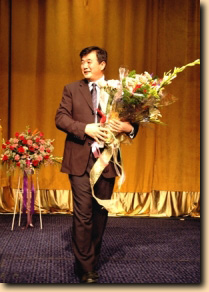 Some years ago the Washington Post (2000) and later the
Some years ago the Washington Post (2000) and later the  “The buzz is that Madonna has become very tight with Lindsay Lohan, sharing religious and professional tips,”
“The buzz is that Madonna has become very tight with Lindsay Lohan, sharing religious and professional tips,” 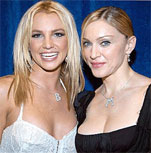 Working with Madonna on a movie can be a disaster. Witness her past film collaborations with husbands Sean Penn (Shanghai Surprise) and Guy Ritchie (Swept Away), “two for two,” flops that is.
Working with Madonna on a movie can be a disaster. Witness her past film collaborations with husbands Sean Penn (Shanghai Surprise) and Guy Ritchie (Swept Away), “two for two,” flops that is.  Yesterday Forbes Magazine proclaimed Tom Cruise “No. 1” on its list of “the world’s 100 most powerful stars”
Yesterday Forbes Magazine proclaimed Tom Cruise “No. 1” on its list of “the world’s 100 most powerful stars”  Last year Elfman began ranting about “suppressive people” (SP).
Last year Elfman began ranting about “suppressive people” (SP). Jenna Elfman repeatedly asked the man “What crimes have you committed?” and “have you raped a baby?”
Jenna Elfman repeatedly asked the man “What crimes have you committed?” and “have you raped a baby?” NXIVM has been called a “cult” and described as “
NXIVM has been called a “cult” and described as “ NXIVM says, “The 5-day intensive training provides participants with a clear understanding of the first principles of success. It constitutes the first five days of the 16-day intensive, and encompasses the foundational practices of both the Ethos and the Origins programs. Participants in the 5-day intensive trainings have access to a certified personal coach for 30 days after their training has concluded.”
NXIVM says, “The 5-day intensive training provides participants with a clear understanding of the first principles of success. It constitutes the first five days of the 16-day intensive, and encompasses the foundational practices of both the Ethos and the Origins programs. Participants in the 5-day intensive trainings have access to a certified personal coach for 30 days after their training has concluded.” Moon has long been friendly with the Bush family and has given millions in honorariums to the first President Bush, who has jetted around the world to speak at venues connected to his interests.
Moon has long been friendly with the Bush family and has given millions in honorariums to the first President Bush, who has jetted around the world to speak at venues connected to his interests.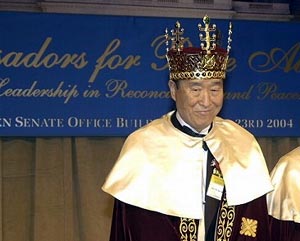 Moon funneled the million from the Washington Times Foundation through the Greater Houston Community Foundation to the Bush library foundation.
Moon funneled the million from the Washington Times Foundation through the Greater Houston Community Foundation to the Bush library foundation. 